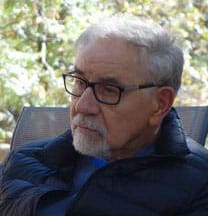During a keynote lecture at a UCLA conference charting the history of Ladino and the ways in which Judeo-Spanish is being studied in the academic world, Eliezer Papo asked rhetorically: “Is Ladino dead?”
As answer, Papo told a joke: “Two friends run into each other on the street. One says, ‘Did you hear about Shimon?’ ‘No; what happened?’ ‘He got hit by a car!’ ‘Was he killed?’ ‘Not right away; he died on the way to the hospital.’ The other says, ‘What mazal! At least he had a few more minutes of life.’ ”
Papo, director of the Gaon Center for Ladino Culture at Israel’s Ben-Gurion University of the Negev, said that — like the victim who has been struck by a car — Ladino may not be dead yet … but it’s in mortal danger.
During his lecture, delivered entirely in fluent and witty Ladino, Papo mentioned that a key barometer of a language’s survival is whether children use it to speak with one another. Unfortunately, that is not the case with Ladino anywhere in the world. Those who know the language tend to be elderly or academics, and even they don’t generally speak with one another in Ladino.
The theme of this year’s ucLADINO symposium, held March 5-6, was “Preservation and Revitalization.” This year, speakers came from Israel, Hungary, Turkey, Mexico, Texas, Washington and Illinois, and presentations ran the gamut from highly academic to tear-inducingly emotional. As in the past, the third annual event was arranged by Bryan Kirschen, who founded ucLADINO several years ago.
Kirschen, 28, is from New York and studied Spanish, Hebrew and Arabic as an undergraduate. He earned master’s degrees in Spanish literature and Spanish/Portuguese linguistics, and spent a semester in Jerusalem studying Sephardic history and language. At UCLA, he’s a doctoral candidate in Hispanic linguistics with a focus on Judeo-Spanish.
The history of Ladino as a Diaspora language for Sephardic Jews starts in Spain, where Jews lived for hundreds of years before they were forced into exile or conversion in 1492. These Jews spoke the Spanish dialect of the region where they lived.
Many Jews exiled from Spain first went to Portugal, then to parts of the Balkans, North Africa and Turkey, where they were accepted, or at least tolerated, and they brought with them their version of medieval Spanish — which had Portuguese, Aramaic, Hebrew and sometimes Arabic mixed in.
For 500 years, Judeo-Spanish remained the mother tongue of Sephardic Jews — Sefarad is Hebrew for “Spain” — whether they lived in Greece, Tunisia or Turkey. For Sephardic Jews, Ladino was more than a home language; it was a reminder of the life from which they had been exiled and the glue that bound their traditions, history and culture.
“Many people have tried to kill Ladino,” Papo said during his lecture, “but somehow it’s survived. The Nazis massacred many Ladino speakers, like the Sephardim in Greece. Those who survived the Shoah were mostly in Turkey and Bulgaria, and many of them went to Israel after World War II.
“Today, the only places where there’s still a critical mass of Ladino speakers is in Istanbul and Israel, but in neither one of those places are they going to carve out a new country — call it ‘Sephardistan’ — where Ladino is used. … So, given that Ladino will not be revived into a living language, as happened with Hebrew, what can be done to make sure Ladino doesn’t become totally extinct?”
Papo suggested that there be more conferences and symposia like the one at UCLA, that university courses be continued and expanded, and that writings in Hebrew and other languages be translated into Ladino.
Kirschen, in his presentation, mentioned that Ladino is alive and well in cyberspace. He cited Rachel Amado Bortnick, a Ladino expert originally from Izmir, Turkey, who, in 1999, started a virtual community called Ladinokomunita. Its 1,500 correspondents contribute Ladino news and comments.
Bortnick, a keynote speaker at the first ucLADINO symposium two years ago, attended this year’s conference, having come from her home in Dallas. She spoke to the Journal about how, for 500 years, Sephardim lived in cultures where they were not fully accepted or assimilated. Their use of Ladino served to separate them from non-Jews in the host country during this time.
Paradoxically, she said, that separation actually helped maintain Ladino as a living language. During the 20th century, in the United States, Canada, Israel and parts of Western Europe, where assimilation of Sephardim has been the norm, the absorption of Sephardim into the host country has hastened the demise of Ladino as a spoken language.
One of the highlights of the conference was a documentary film, “Once Upon a Time on 55th and Hoover.” It tells the story of Jews from the Greek island of Rhodes who settled in South Central Los Angeles during the early part of the 20th century.
The film was made by Spanish academician Andrés Enrique-Arias while he was doing graduate work at USC in Spanish historical linguistics, and it shows how — at least for several generations — these “Rhodesli” maintained their language, food, traditions, celebrations and Ladino songs while living in Los Angeles.
Much of the film focuses on Arthur Benveniste, now 80, who grew up in that neighborhood. At the symposium, Benveniste introduced the film, mentioning that when young, he rejected his parents’ traditions and culture. Benveniste said he wasn’t the only one who did this: Usually, the first generation of Rhodesli spoke Ladino among themselves, the second generation spoke much less, and, by the third generation, daily use of Ladino had largely disappeared.
On the evening of March 5, in coordination with the Sephardic Music Festival in L.A., there was a concert at UCLA’s Fowler Museum featuring Sarah Aroeste, a young woman whose family is from the Balkans. She sang Ladino songs, some traditional and some of her own composition, while a screen behind her showed black-and-white film footage of her grandparents. The crowd was largely elderly, and when she sang songs known to them, many in the audience joined in.
Benveniste was part of the crowd, singing enthusiastically.
“When we were young,” he said while talking in the film, “we really didn’t realize the importance of Ladino. … Now that we’re older, we realize we should have been preserving it.
“When you lose a language,” Benveniste concluded wistfully, “you don’t just lose a language, you lose a whole world.”























 More news and opinions than at a Shabbat dinner, right in your inbox.
More news and opinions than at a Shabbat dinner, right in your inbox.